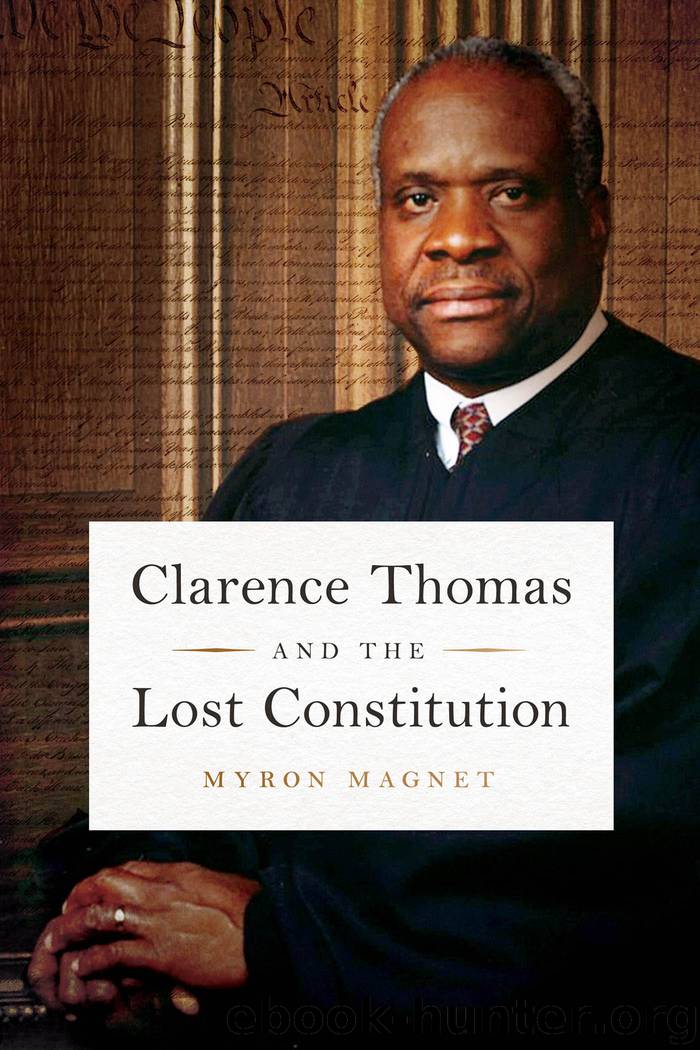Clarence Thomas and the Lost Constitution by Myron Magnet

Author:Myron Magnet
Language: eng
Format: epub
Publisher: Encounter Books
Published: 2019-05-09T04:00:00+00:00
A NOTE of icy scorn runs through Thomas’s opinion in Grutter v. Bollinger, a 2003 case in which the Court upheld affirmative-action admissions to the University of Michigan Law School. In concurring that racial preferences should end in 25 years, and dissenting to every other part of the majority’s ruling, Thomas is striving for jocularity, but he seems to have run out of patience with the self-cherishing antics of overpaid bureaucrats like university president Lee Bollinger (later the longtime president of Columbia) and his fellow administrators, glowing with the virtue of their good intentions and careless of the havoc they wreak. Here they have an institution financed by the taxpayers of their state, though only 27 percent of admitted students are Michiganders and only 16 percent of graduates stay in the state. So for starters, there’s no compelling state interest in having this school exist.
And there’s less compelling state interest for it to admit ill-prepared minority students in order to achieve “diversity,” which offers no educational benefit to anyone, despite the law school’s claim. It is merely an aesthetic preference of Bollinger et al., who like a smattering of black and brown faces in their lecture halls. Too bad that the Court’s majority fell for “a faddish slogan of the cognoscenti,” though at least it tacked on a 25-year sunset clause to its approval of the law school’s brand of affirmative action (a stipulation that confesses that Grutter is an exercise in social engineering, not jurisprudence). Despite precedents holding “that racial classifications are per se harmful and that almost no amount of benefit in the eye of the beholder can justify such classifications,” the majority decision still clings to “the benighted notions that one can tell when racial discrimination benefits (rather than hurts) minority groups, and that racial discrimination is necessary to remedy general societal ills.”
Much has been said about the supposed (but illusory) educational benefits to white students of a racially diverse class, and we know its benefits to the administration’s self-regard, but what about affirmative action’s supposed minority beneficiaries? “The Law School tantalizes unprepared students with the promise of a University of Michigan degree and all of the opportunities that it offers,” Thomas writes. “These overmatched students take the bait, only to find that they cannot succeed in the cauldron of competition.” And what about the “handful of blacks who would be admitted in the absence of racial discrimination”—like Thomas at Yale Law? “The majority of blacks are admitted to the Law School because of discrimination, and because of this policy all are tarred as undeserving.” Moreover, the taint follows the deserving no matter how high they ascend and how much they achieve, Thomas says, as he well knows.
Instead of their constant “social experiments on other people’s children,” Thomas writes, why don’t the nation’s elites honor the heartfelt and prophetic plea of Frederick Douglass a century and a half ago? “What I ask for the negro is not benevolence, not pity, not sympathy, but simply justice. The American people have always been anxious to know what they shall do with us.
Download
This site does not store any files on its server. We only index and link to content provided by other sites. Please contact the content providers to delete copyright contents if any and email us, we'll remove relevant links or contents immediately.
The Secret History by Donna Tartt(16692)
The Social Justice Warrior Handbook by Lisa De Pasquale(11501)
Thirteen Reasons Why by Jay Asher(7815)
This Is How You Lose Her by Junot Diaz(5810)
Weapons of Math Destruction by Cathy O'Neil(5064)
Zero to One by Peter Thiel(4846)
The Myth of the Strong Leader by Archie Brown(4801)
Promise Me, Dad by Joe Biden(4464)
Beartown by Fredrik Backman(4453)
How Democracies Die by Steven Levitsky & Daniel Ziblatt(4436)
Stone's Rules by Roger Stone(4430)
The Fire Next Time by James Baldwin(4358)
100 Deadly Skills by Clint Emerson(4097)
A Higher Loyalty: Truth, Lies, and Leadership by James Comey(4047)
Rise and Kill First by Ronen Bergman(4031)
The David Icke Guide to the Global Conspiracy (and how to end it) by David Icke(3901)
The Farm by Tom Rob Smith(3886)
Secrecy World by Jake Bernstein(3795)
The Doomsday Machine by Daniel Ellsberg(3744)
